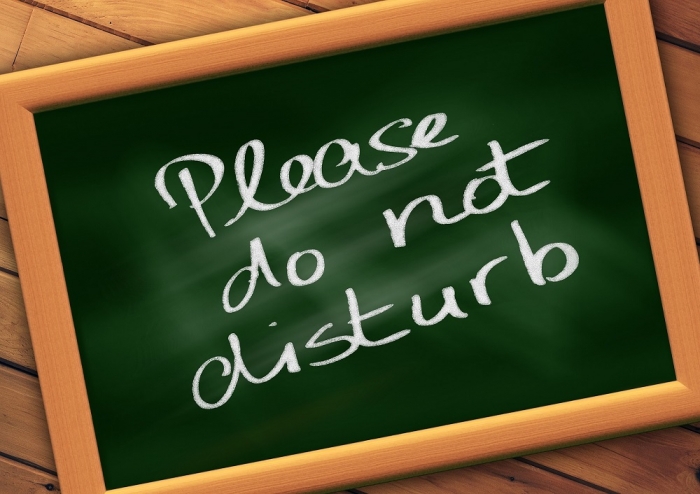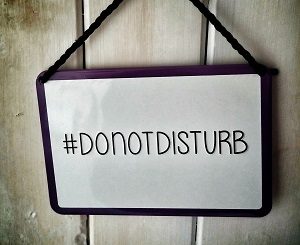Is electronic distraction stressing you out? We are a society immersed in…

Deflecting Distractions: Absolute Distraction Disrupts, Absolutely! (Pt. 1 of 3)
3.
Deflecting Distractions: Absolute Distraction Disrupts, Absolutely! (Pt. 1 of 3)
Absolute Distraction Disrupts, Absolutely!
Unless you reside or work in a solitary, secluded place, you most likely have exposure to extraneous activity in your surroundings. Sounds, sights, and events totally unrelated to your present task may abruptly and completely grab your attention. Your eyes, ears, mind, and sometimes body quickly switch gears to another point of focus.
How does it feel to be jarred from your work?
 This Udemy In Depth: 2018 Workplace Distraction Report graphs the impact of distraction in the workplace. It reveals 54% of people surveyed say they aren’t performing as well as they should.
This Udemy In Depth: 2018 Workplace Distraction Report graphs the impact of distraction in the workplace. It reveals 54% of people surveyed say they aren’t performing as well as they should.
If you believe you could get more done with less stress, were it not for distractions, then read on.
While some distractions may be refreshing diversions, in this series we are addressing unwelcome distractions – the ones that disturb and deflect you from your focus. You are going to learn how to turn that around, so you are deflecting distractions!
What are the major sources of distractions?
In order to acquire the skill of deflecting distractions, it is necessary to identify the distractions that cause you stress.
For most of us, the major types of distraction are . . .
- Human: Visitor Interruptions
- Mechanical and Electronic Disturbances
- Random Background and Nature Activities
There also are Responsibility Distractions, which are reasonable requirements for attention, such as from a child or other loved one. We regard these as welcome and necessary distractions of life, so we will not address them here.
In this post, we are focusing on deflecting human distractions, such as well-meaning passersby. They may not be rude but they sure do intrude on your work time. (In the next post of this series, we will address the other sources of distraction.)
About You Personally . . .
Begin with a brief self-reflection on the source and experience of distraction in your life.
The Oxford Living Dictionary defines a distraction as:
“a thing that prevents someone from giving full attention
to something else”.
With this working definition in mind, think to yourself:
- How frequently do people distract you?
- How much of your day is given to people divert you from your activity?
- How do you feel when you return to your task?
- How much time does it take to recover your mental focus to the point where you left off? Is this stressful? (A study found the brain needs an average of 25 minutes to recover the earlier focus of the original task)
- How much more productive could you be without these distractions?
Upon reflecting, you may discover that your experience of distraction extends further than the first definition
Oxford’s second definition of distraction is
“extreme agitation of the mind or emotions”.
Whether major or minor, distractions are inextricably tied to the occurrence of stress in your daily life. “The more distracted we are, the less happy we become.”
Human Distractions of the Unwelcome Kind
Ironically, courtesy and compassion can invite disturbance.
Human distractions often occur because we allow them. Needy people, complaining people, as well as well-meaning people may regard you favorably as an understanding chap, one with a good ear for whatever is currently on their minds. These visitors may be unaware of your need to work without interruption, or they may just be completely consumed with their own immediate needs.
In any case, your extreme courtesy in accommodating them has robbed you of your focus and your time. This leads to distraction distress.
Even worse, some people make a habit of avoiding their own responsibilities and justifying it with the complicity of others. Don’t join them. People who suffer from “chronic distraction and mental leapfrogging may have attention and focus issues,” in which case your compassion in being there for them is an inadequate substitute for outside therapy to address their mental habits.
Beware: Don’t allow their problem to become your problem.
Moreover, if you are the one who is courteous, convenient and readily available, you know how this can cause full-scale interference and delays with your work. Once the intrusions hinder your overall performance, they can lead you to toxic levels of stress! I was almost there myself and learned. Face it:
You can’t be everything to everyone!
Please be assured: As you shall see in our next section, I certainly am not condoning rudeness as an antidote to courtesy and compassion. Just know the boundaries in accommodating intruders and use your professional skills to command respect for your time and space.
Deflecting Distractions with Professional Suave
 When the visitors wear out their welcome and the diversions become disturbances, it’s your time to be deflecting distractions. Take control of your time management and stress management. You can turn away unwelcome visitors without compromising your professional or social etiquette. Here are the three ways that work.
When the visitors wear out their welcome and the diversions become disturbances, it’s your time to be deflecting distractions. Take control of your time management and stress management. You can turn away unwelcome visitors without compromising your professional or social etiquette. Here are the three ways that work.
#1: Courteous Candor
Look the intruder straight in the eyes with a pleasant expression, natural not forced. Then tell them politely and straightforwardly that you are unable to visit now because it’s your work time.
“I’d love to talk now but this just isn’t the time. I need to stay focused and finish this work. I’m sure you understand.”
You can offer to visit at another mutually convenient time. That’s your prerogative. Just take care not to over-extend yourself with social obligations. Your time is valuable.
Watch out for this: Don’t allow them to force further explanation. That surely would be winning you over to distraction. Keep it short and sweet. If they don’t move on, say no more than “Thanks for understanding.” Give a pleasant but assertive nod and turn back to your work. Gabbing to someone who appears not to be listening is no fun.
Note that micro-expressions in the eyes and body language can be revealing. So, don’t prolong your tolerance of the distractions until you are fed up with the person and your own virtue of patience. If you know there is a regular hobnobber around the office or community, be prepared to assert yourself courteously to deflect future distractions. You will gain the due respect for yourself and your time.
#2: Relocation
If you are working at home, situate yourself Far from the Madding Crowd, that is, away from the hubbub of family activity. High traffic areas are like open invitations for you to participate, no matter what you’re doing. The outside goings-on demand their own all-consuming attention. Don’t try to split your focus.
Find a spot where you are unseen. Out of sight, out of mind! This will provide at least temporary deflection of distraction.
If you are in an outside workplace, there may be more constraints on your mobility. However, consider any acceptable options for a short-term reprieve. If you are unable to move from a high traffic spot that attracts regular social interchange, then you might post a little cartoon that cordially and humorously that begs forgiveness.
Working Warrior Here
Let’s save the greetings for later.
Thank you!
#3: Unavailability
Open doors are enticements. So are vacant seats near your desk.
 So, close off areas of accessibility and you will be deflecting distractions by being less inviting to chatty colleagues.
So, close off areas of accessibility and you will be deflecting distractions by being less inviting to chatty colleagues.
Place things onto nearby chairs, so no one can sit there and chat.b
Wear headphones, either to listen to music, to muffle outside sounds, or just as a prop to discourage transitory visitors.
The prevention strategy: Make yourself inconvenient.
These indirect maneuvers will likely drive prospective visitors onward to bend another ear.
The Takeaway
Deflecting distractions of the human kind is a simple art. Yet people constantly fall prey to the opportunity to turn away from their task. Stress sets in, as lost time diminishes performance, productivity, and even career advancement.
You can deflect the distractions of visitors professionally and unobtrusively with simple techniques. When you truly respect your time this way, you more easily command others to respect your time as well.
In the next post, we move from human distraction to electronic distraction — a problem bigger than you think! Click here to learn more …
What’s Your Greatest Distraction?
Share it in the Comment box below!
10 Stress Habits and Alternatives!
If not, click here





Your style is unique in comparison to other people I’ve read stuff from. Thank you for posting when you’ve got the opportunity, Guess I will just bookmark this site.
Hi, I do believe this is a great web site. I stumbledupon it 😉 I am going to revisit yet again since i have bookmarked it. Money and freedom is the greatest way to change, may you be rich and continue to guide other people.
This web site truly has all the information and facts I wanted concerning this subject and didn’t know who to ask.
How many blog post should i have before i start promoting it?
I want to to thank you for this wonderful read!! I certainly enjoyed every little bit of it. I have you book marked to check out new things you post…
Howdy, I believe your web site could possibly be having web browser compatibility problems. Whenever I take a look at your web site in Safari, it looks fine however, when opening in IE, it’s got some overlapping issues. I just wanted to provide you with a quick heads up! Aside from that, wonderful blog.
Greetings! Very helpful advice in this particular article! It’s the little changes which will make the most important changes. Thanks for sharing!
The the next occasion I just read a blog, I hope which it doesnt disappoint me just as much as that one. I mean, I know it was my choice to read, but I really thought youd have some thing interesting to state. All I hear is a lot of whining about something you could fix when you werent too busy searching for attention.
There is definately a great deal to learn about this subject. I love all the points you’ve made.